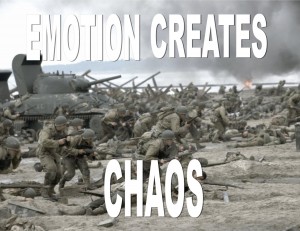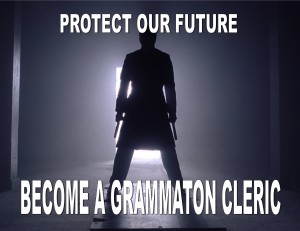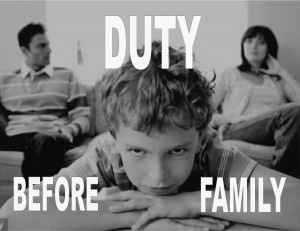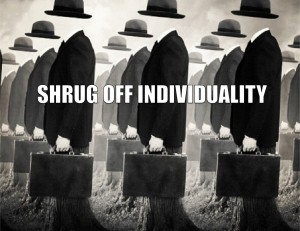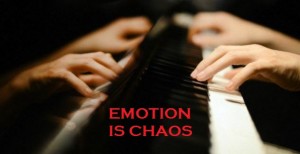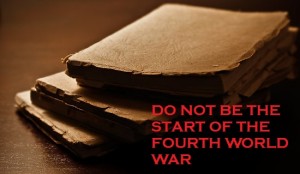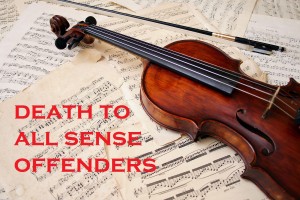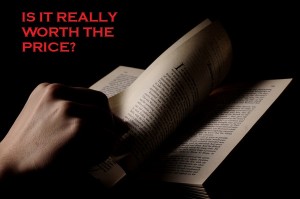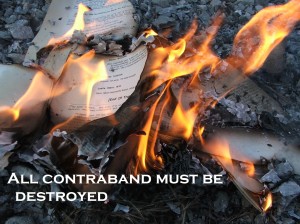Group six decided make a propaganda campaign for the movie Equilibrium, a dystopian science fiction film. The movie is set in a futuristic society (it takes place in 2072) named Libria, where citizens take a drug called Prozium to suppress their emotions and foster obedience to the totalitarian regime. The regime incinerates contraband items that have the potential to stimulate emotion such as music, art, and literature. Citizens who possess contraband and do not take Prozium are known as Sense Offenders. The law enforcement, called the Grammaton Clerics, destroy contraband and execute Sense Offenders.
Our group chose to create visual forms of propaganda to reflect the complexity of Librian governmental control. Visual propaganda is almost inherently a form of art because it has an aesthetic specific to its creators. Since art is banned in Libria, we faced the challenge of deciding what images were acceptable to be displayed. This ambiguity was compounded by the fact that Libria is set in a digital age where photography could easily be considered a form of art. Because images are so integral to visual propaganda, we decided to primarily use photographs to convey the messages. We chose dark images that fit the artistic style of the movie. These images fit the perspective of the regime: they portray the arts and individuality as dangerous and destructive. The darkness of the images suggests that the denial of emotion coupled with duty and obedience to the regime are the only ways that humans can continue to survive in a world that would otherwise be ripped apart by emotion. Our posters seek to accomplish the goals of the regime by influencing citizen’s perceptions and controlling their behaviors. They use scare tactics to deter citizens from using contraband while flag-waving encourages them to take Prozium and report Sense Offenders.
Likewise, the propaganda video relies on disturbing historical images and darkness to visually convey the dangers of human emotion. We chose to make the film silent since the regime banned music. We also decided against having sound effects or a voiceover, instead allowing the full weight of the words and images to sink into the viewer. The pressure created by darkness and solemnity of the white words on the black background resolves with the appearance of the national flag at the end of the video. The patriotic flag conveys the authority of the government with the assurance that those who submit to the regime and its use of Prozium will survive. The ad nauseum repetition of the video and the posters seeks to make the citizens accept the fact that emotions and emotional stimuli will destroy their society.
We used quotes and screencaps from the movie to make our video.
Movie Citation:
Equilibrium. DVD. Directed by Kurt Wimmer. 2002; New York City, NY :Dimension Films, 2003.
Image Sources:
“Book Burning.” Wikipedia. http://en.wikipedia.org/wiki/Book_burning (accessed October 29, 2014).
C., Radford. “Christian Bale in Equilibrium (Video).” Lazy Tech Guys. http://lazytechguys.com/news/christian-bale-in-equilibrium-video (accessed October 29, 2014).
Cello and Strings. http://www.celloandstrings.com/ (accessed October 29, 2014).
Emrick, LeeAnne. “Old Poetry Books.” Redbubble. http://www.redbubble.com/people/lmemrick/works/3545140-old-poetry-books (accessed October 29, 2014).
Enck, Denise. “Self-publishing Your Poetry Book or Broadside.” Empty Mirror. http://www.emptymirrorbooks.com/publishing/self-publishing.html (accessed October 29, 2014).
Jain, Anurag. “Life of Conformity in a Free Society.” Neev Forum For Integral Living. http://neevintegralliving.com/archives/756 (accessed October 29, 2014).
“Saving Private Ryan.” Fanpop. http://www.fanpop.com/clubs/saving-private-ryan/images/1669340/title/storming-beach-wallpaper (accessed October 29, 2014).
“Separating parents forced to attend custody classes so they realize damage to children.” Daily Mail, September 25, 2010. http://www.dailymail.co.uk/news/article-1315115/Separating-parents-forced-attend-custody-classes-realise-damage-children.html (accessed October 29, 2014).
“Violin, musical instrument, bow, sheet wallpaper.” ForWallpaper.com. http://www.forwallpaper.com/wallpaper/violin-musical-instrument-bow-music-sheet-130273.html (accessed October 29, 2014).
Woollaston, Victoria. “Forget brain training: Playing a musical instrument can sharpen your thoughts – and help ward off depression and dementia.” Daily Mail, September 27, 2013. http://www.dailymail.co.uk/health/article-2435013/Forget-brain-training-Playing-musical-instrument-sharpen-thoughts–help-ward-depression-dementia.html (accessed October 29, 2014).
